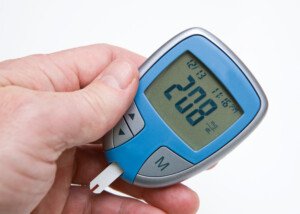
Over seven million Americans have NO idea they have diabetes!
Is it really so difficult to know you probably have diabetes without having blood tests?
Many people actually do worry they “might” have diabetes despite not having seen a doctor.
Are you worried, like many people, that you might have diabetes but are afraid to find out in a medical setting?
Some symptoms that can be caused by diabetes can also be caused by very benign conditions – as well as cancer.
There are ways you can tell you might have diabetes.
You should have the appropriate tests done at a medical clinic rather than self-diagnose or self-un-diagnose.
Here is what Lucille Hughes, RN, CDE, assistant vice president of Diabetes Education and Program Design for Catholic Health of Long Island.
Frequent Urinating and Increased Thirst
“People with uncontrolled diabetes may have symptoms of frequent urination and increased thirst,” says Hughes. “These occur when your blood sugar rises.
“During this time your kidneys try to flush out our kidneys by increasing fluid to flush the glucose out into your urine.
“This is also why increased urination and increased thirst are often together.
“As your body is flushing out your kidneys it sends a signal to your body to have you drink more so that it has more fluid to use and helps prevent dehydration.”
New-Onset Hunger Despite Eating
“Carbohydrates turn to sugar (glucose) once we eat them,” says Hughes.
“When we don’t have enough or if we take in enough but our body is not able to use the carbohydrate properly (insulin deficiency or insulin resistance) due to diabetes, we will feel hungry.
“Our brain is trying to make you take in more energy by making you hungry.
“Your brain doesn’t know that you may not be able to make enough insulin [or properly use existing insulin] to turn those carbohydrates into energy; it just makes you want to eat.”
Eating more won’t solve the problem; this will raise blood sugar.
Weight Loss Despite Eating More (type 1)
You definitely know you might have diabetes when you have new-onset weight loss despite eating the same or even more.
“When the body cannot use glucose for energy due to a lack of insulin, it must turn to burning fat for energy,” explains Hughes. “This causes weight loss.
“However, it also puts the person at risk for developing a life threatening complication associated with diabetes called diabetic ketoacidosis (DKA). This requires immediate medical attention.”
Extreme Fatigue
“This is very common when blood sugars are either high or low,” says Hughes.
“In either case, your body does not have enough energy to use and you feel tired.
“Low blood sugar, which is defined as a blood sugar below 70 mg/dl, is dangerous and needs to be treated right away.”
Extreme fatigue can be caused by so many other conditions (e.g., low thyroid, heart disease, celiac disease, cancer), that this is not a symptom that’s likely to make someone think, “I probably have diabetes.”
Blurry Vision
This is a symptom that falls more strongly under the precept of, “You know you probably have diabetes when…”
Hughes explains, “Blurry vision may just be a temporary condition that is associated with uncontrolled diabetes.
“Both high blood sugar (hyperglycemia) and low blood sugar (hypoglycemia) can cause blurry vision.
“When blood sugar is high it causes the lens of the eye to swell with fluid causing blurry vision.
“Low blood sugar can cause blurry vision or double vision as well.
“Since blurry vision and double vision can be symptoms of many other things [such as a mini stroke], always see a medical professional to investigate the cause.”
Slow Healing Cuts and Bruises
“Slow healing cuts can be associated with diabetes when blood sugars are high. Unfortunately, bacteria love to grow in a sugar environment.
“When blood sugars are high, the blood feeding the skin and tissue contains this sugar and promotes bacteria growth which increases the risk for infection and decreases healing of the wound.”
Tingling, Pain, or Numbness in the Hands or Feet (type 2)
While some people wonder if they may have a primary neurological condition, others suspect they might have diabetes.
Hughes says, “Uncontrolled diabetes can cause complications for both type 1 and type 2 diabetes.
“Nerve damage can occur due to uncontrolled diabetes resulting from high blood sugar.
“This can cause damage to the nerves called neuropathy. Neuropathy can manifest itself with pain or numbness.”
If you suspect you could have diabetes, it’s time to make an appointment with your doctor without delay.
“Some people with type 2 diabetes do not even notice any changes or symptoms,” says Hughes.
“It is very important that you see your doctor regularly and are tested for diabetes especially if you have type 2 diabetes in your family.
“Early detection can decrease the risk of complications.
“Identifying and diagnosing diabetes early in the prediabetes stage may allow you to make changes in your lifestyle [that can reverse prediabetes] such as incorporating 150 minutes of physical activity a week and losing 5-7 percent of your body weight.
“Both of these changes have been shown to prevent or delay type 2 diabetes.”
 For many years Lucille Hughes has worked as a certified diabetes educator for inpatient acute care, home care, private endocrinology practice and outpatient diabetes education centers.
For many years Lucille Hughes has worked as a certified diabetes educator for inpatient acute care, home care, private endocrinology practice and outpatient diabetes education centers.
 Lorra Garrick has been covering medical, fitness and cybersecurity topics for many years, having written thousands of articles for print magazines and websites, including as a ghostwriter. She’s also a former ACE-certified personal trainer.
Lorra Garrick has been covering medical, fitness and cybersecurity topics for many years, having written thousands of articles for print magazines and websites, including as a ghostwriter. She’s also a former ACE-certified personal trainer.
.









































